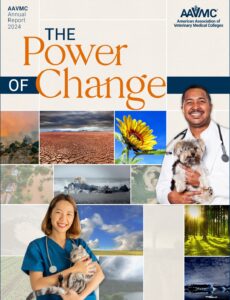The Council on International Veterinary Medical Education (CIVME) is an initiative of the American Association of Veterinary Medical Colleges (AAVMC), which is keen to promote and share best practices in veterinary medical education around the world. The council’s research grant program will provide a means for:
- Communication and collaboration that advances veterinary medical education around the world
- Collaboration amongst educational researchers
- Dissemination of innovations and other educational advances, to magnify the impact of projects by outreach to educators and their respective organizations
The CIVME Research Grant Program will support initiatives that align with (one of) the above mentioned goals. The applicant(s) must clearly and convincingly describe that the proposed project promotes international collaboration in veterinary medical education.
Proposals can be in one of two categories:
- Educational research projects (ERP)
- Educational Exchange Projects (EEP)
Guidelines:
- The total budget requested should not exceed $10,000.
- The project and budget period should not exceed 24 months.
- Due to the limited size of the CIVME grants, indirect project costs are not considered. Indirect costs are those associated with the overall operations and maintenance of the organization and not directly related to the project described in the grant application.
Your application must be “Submitted as Final” by 11:59pm (EDT) on December 6, 2024
A few general application instructions:
- Use specific textbox provided for including any references; references are optional, however, strongly encouraged.
- While filling the application form, please ensure to save as draft frequently to avoid loss of data.
- CIVME can provide a translation service; please contact CIVME@aavmc.org for any translation needs or questions.
- Current CIVME Core or Alternate members are not permitted to be part of a CIVME grant application.
- Current holders of a CIVME grant (including both the principal investigator (PI) and all collaborators) are not permitted to apply for another grant either as the PI or as a collaborator until the previous grant has been completed and the final report submitted to CIVME and approved by CIVME.
- Applications must represent at least 3 CIVME regions and one of those must be from Africa, Asia, Latin America or Middle East/North Africa. CIVME regions.
- If you’re seeking collaborators or are interested in joining a CIVME grant project, use the CIVME Learning Community to connect with other educators. You can do this by posting in the Project Ideas and Collaboration Requests Discussion Forum within the Funding & Publication Opportunities section.
- Please contact civme@aavmc.org with any questions or concerns.
- The grant application will open on Thursday, September 12, 2024. For more information, please contact civme@aavmc.org. Submit grant applications here.
- All applications must be submitted through the online CIVME grant application portal. No hard copy or email applications will be considered.
Previous grant recipients:
2017:
Identifying and Evaluating Core (Day-1) Knowledge, Skills and Experience Necessary for Practicing Aquatic Veterinary Medicine. Dr. David Scarfe, University of Pretoria, Faculty of Veterinary Sciences
Development of internationally relevant learning outcomes for undergraduate and postgraduate study in shelter medicine, Dr. Jenny Stavisky, University of Nottingham School of Veterinary Medicine and Science
2018:
Creating the next generation of evidence-based veterinary practitioners and researchers: What are the options for globally diverse veterinary curricula? Dr. Heidi Janicke, St. George’s University
The perceptions of final-year veterinary science students, studying at four international veterinary schools, regarding the suitability of the undergraduate professionalism training curriculum, Dr. Stuart Gordon, Massey University
Towards an International Veterinary Immunology Teaching Network and Platform, Dr. Femke Broere, Utrecht University, Faculty of Veterinary Medicine
Establishing evidence-based wellness practices for veterinary medical students to decrease burnout, depression, anxiety and improve quality of life: A response to increasing rates of veterinarian suicide, Dr. Munashe Chigerwe, University of California-Davis
2019:
Art & Identity: Using creative methods to support reflection on identity development, Dr. Elizabeth Armitage-Chan, Royal Veterinary College
Optimizing work-based learning in veterinary undergraduate studies by identifying factors and issues that contribute to the experiences of students, placement providers and faculty, Dr. Md. Ahasanul Hoque, Chittagong Veterinary and Animal Sciences University
2020:
What makes a curriculum leader in veterinary education? Dr. Elizabeth Armitage-Chan, Royal Veterinary College
Appalachia to East Africa: Improving Veterinary Student Outcomes through Teacher Training, Dr. Jamie Stewart, Virginia-Maryland College of Veterinary Medicine
Capacity building in veterinary educational research by developing an open access resource to support community members, Dr. Julie Hunt, Lincoln Memorial University
2021:
Global Grand Rounds in Diagnostic Imaging Educational Exchange, Dr. Masahiro Murakami, Purdue University College of Veterinary Medicine
“Eeeesing” the stress: Educators’ experiences of epistemic emotions, Dr. Elizabeth Armitage-Chan, Royal Veterinary College
Identifying and sharing innovations in clinical skills teaching developed globally in response to COVID-19, Dr. Rebecca Parkes, City University of Hong Kong
2022:
Non- University Veterinary Educational Trips, Dr. Rebecca Garabed, The Ohio State University
Initiation of a Global Collaborative Veterinary Telemedicine Program to enhance Veterinary Education and Diagnostics, Dr. Sarah Corner, Michigan State University
Evaluating International Approaches to Teaching Core Concepts in Veterinary Radiology Positioning, Dr. Jane Manfredi, Michigan State University
2023:
Bridget Garner, University of Georgia – International active learning strategies for veterinary clinical pathology and beyond
Sue Rackard, University College Dublin – An international study of teaching and assessment of professionalism competencies in Veterinary Medicine
Arend Werners, St. George’s University – Threshold concepts and capabilities in veterinary pharmacology; a multi-center international study







SHARE